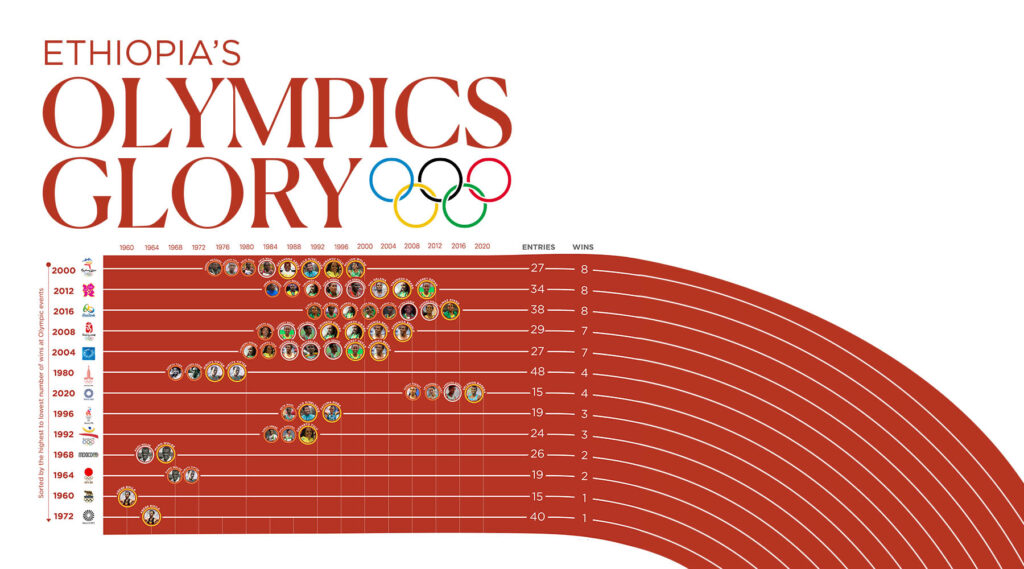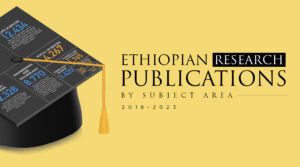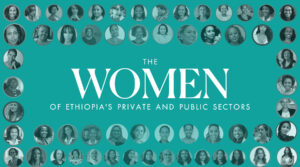For many Ethiopians, childhood memories are filled with nights spent glued to the TV or listening intently to the radio, trying to decipher the commentator’s passionate play-by-play. Our eyes would widen with excitement every time we heard a mispronounced “Gebrselassie” or “Dibaba.” Ethiopia’s journey in the Olympics is a tale of triumph and endurance that inspired boys and girls around the world, especially those in Ethiopia. Since its debut in 1956, Ethiopia has become synonymous with long-distance running, producing world-class athletes who have consistently excelled on the global stage with remarkable athleticism. This is our take on Ethiopia’s Olympic legacy, highlighting the key athletes and their remarkable performances over the decades.

The Road to Olympic Qualification
Before anyone is deemed a medalist, before they even step on the tracks, there is a rigorous process athletes have to go through, and it’s no different for Ethiopian athletes. For example, Ethiopian runners must meet several criteria, including international standards, and perform well in both national and international competitions. Athletes must be Ethiopian citizens who comply with anti-doping regulations and undergo regular testing. They must also meet or exceed the stringent qualification times set by the International Association of Athletics Federations (IAAF) for their specific events, often requiring elite-level performance at recognized international competitions such as the World Championships and Diamond League meetings.
National championships, particularly the Ethiopian Athletics Championships, are crucial, as is consistent performance in these and other competitions. The Ethiopian Athletics Federation (EAF) oversees the selection process, organizes national trials, and considers athletes’ performance consistency and head-to-head results. Once selected, athletes participate in intensive training camps, supported by coaching, medical assistance, and access to training facilities to ensure they are in peak condition for the Olympics.
Pioneers and Champions: Ethiopia’s Early Olympic History
Ethiopia’s Olympic journey began with a landmark victory by Abebe Bikila, who won the gold medal in the men’s marathon at the 1960 Rome Olympics. Bikila’s barefoot run set a world record and made him the first African to win an Olympic gold medal. He defended his title in the 1964 Tokyo Olympics, solidifying his legacy as a pioneering figure in athletics.
Mamo Wolde followed in Bikila’s footsteps, winning gold in the marathon and silver in the 10,000 meters at the 1968 Mexico City Olympics. Wolde’s achievements added to Ethiopia’s growing reputation in long-distance running, setting the stage for future generations of Ethiopian athletes.
Miruts Yifter, known as “Yifter the Shifter,” is another household name. He won two gold medals and one bronze in the 1972 and 1980 Olympics. His unique running style and tactical prowess earned him a special place in Ethiopian sports history.
The Golden Era: Haile Gebrselassie and Kenenisa Bekele
The 1990s and 2000s marked a golden era for Ethiopian athletics, with athletes like Haile Gebrselassie and Kenenisa Bekele dominating the track. Gebrselassie won gold in the men’s 10,000 meters at the 1996 Atlanta Olympics and successfully defended his title at the 2000 Sydney Olympics. His remarkable performances set new Olympic records and inspired a new generation of runners.
Kenenisa Bekele continued Ethiopia’s tradition of excellence by winning three gold medals and one silver in the 2004 and 2008 Olympics. His victories in the men’s 10,000 meters and 5,000 meters showcased his incredible endurance and speed, earning him a place among the greatest long-distance runners in history. In July 2024, ESPN named Kenenisa among Africa’s 25 best athletes of the 21st century.
Other notable multi-medalists include Gete Wami and Sileshi Sihine. Wami’s success in the women’s 10,000 meters and 5,000 meters and Sihine’s silver medals in the men’s 10,000 meters at the 2004 and 2008 Olympics highlight the depth of talent in Ethiopian athletics.
The Rise of Female Athletes
Ethiopian female athletes have also made significant contributions to the country’s Olympic success. Derartu Tulu became the first African woman to win an Olympic gold medal by triumphing in the women’s 10,000 meters at the 1992 Barcelona Olympics. She added another gold medal in the same event at the 2000 Sydney Olympics, along with a bronze in the 2004 Athens Olympics.
Tirunesh Dibaba, also known as the “Baby-Faced Destroyer,” is one of Ethiopia’s most celebrated athletes. She won three gold medals and three bronze medals across the 2004, 2008, 2012, and 2016 Olympics. Her dominance in the women’s 10,000-meter and 5,000-meter events has solidified her status as a legend in the sport. In fact, the Dibaba sisters— Genzebe, Tirunesh, Anna, and Ejegayehu— are Ethiopian distance runners who have taken the world by storm with their incredible talent and inspiring story and you can read more about them here. Meseret Defar and Almaz Ayana have further contributed to Ethiopia’s medal tally, with Defar winning two gold medals and one bronze in the women’s 5,000 meters between 2004 and 2012, while Ayana set a world record in the women’s 10,000 meters at the 2016 Rio de Janeiro Olympics.
Recent Successes and Future Prospects
Ethiopia’s Olympic success has continued in recent years, with athletes like Selemon Barega, Tiki Gelana, and Feyisa Lilesa achieving podium finishes. Barega won gold in the men’s 10,000 meters at the 2020 Tokyo Olympics, while Tiki Gelana and Feyisa Lilesa secured medals in the women’s and men’s marathons, respectively.
Ethiopia’s commitment to nurturing talent and promoting athletics ensures a bright future for its Olympic prospects. The new generation of runners is poised to carry the torch of their predecessors, maintaining Ethiopia’s status as a powerhouse in long-distance running for years to come.
Expanding Beyond Long-Distance Running
While Ethiopia’s strength has historically been in athletics, the country has also ventured into other Olympic sports. Ethiopia’s participation in the Winter Olympics is notable, with Robel Teklemariam competing in cross-country skiing in 2006 and 2010. Ethiopian athletes have also participated in Taekwondo, boxing, swimming, and cycling, showcasing their versatility and determination to excel beyond traditional long-distance events.
A Legacy of Inspiration
Ethiopia’s Olympic legacy is not limited to medal counts. The country’s athletes have consistently set new benchmarks and inspired countless others. From Abebe Bikila’s barefoot marathon win to Tirunesh Dibaba’s multiple gold medals, Ethiopian athletes’ stories have inspired athletes worldwide. Their achievements highlight Ethiopia’s enduring passion for long-distance running and the remarkable talent of its athletes.
Ethiopia’s dominance in Olympic athletics is set to endure, inspiring future generations of runners and athletes to strive for greatness. As the country continues to produce world-class athletes and expand its participation in various sports, Ethiopia’s legacy at the Olympics will remain a source of national pride and global admiration.











2 Responses
Keep learning and improving, because knowledge is power. Euro 2024
Forget my code